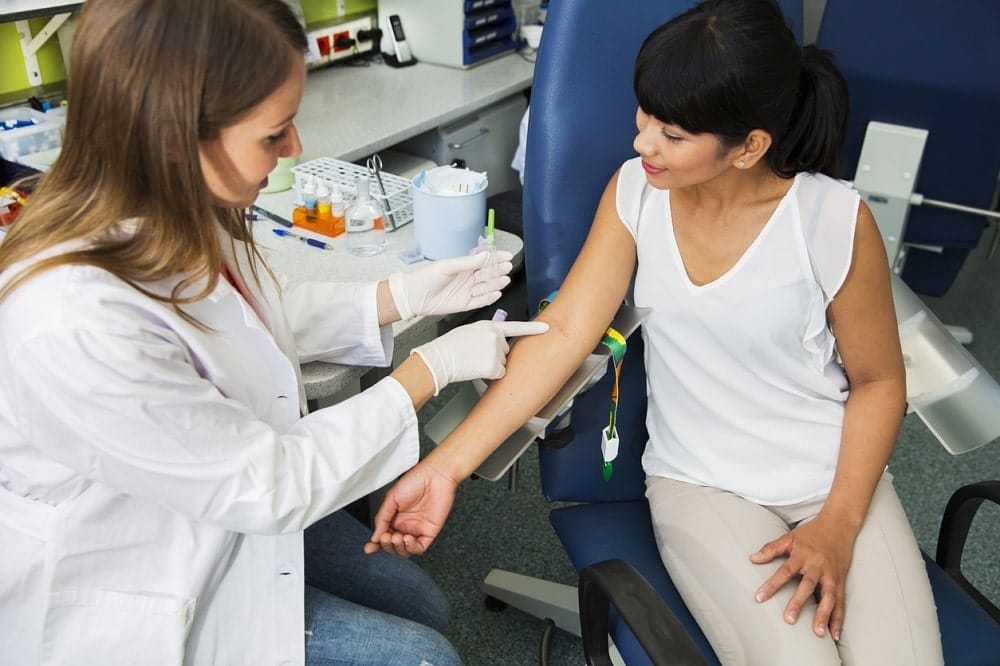Table of Contents
A diagnosis of growth hormone deficiency (GHD) is necessary before adults can receive HGH therapy. Growth hormone deficiency testing provides the essential information a doctor who specializes in hormone replacement therapy requires to give an accurate diagnosis. In this report, we look at “how to test for growth hormone deficiency,” along with the types of testing required. We will examine the reasons for the specific blood tests and the information they provide.
Unlike when measuring estrogen or testosterone levels, the growth hormone deficiency test does not directly measure how much growth hormone is in the bloodstream. While some hormones continue to circulate through the bloodstream all day, growth hormone does not. Instead, it enters into circulation from the pituitary gland in a pulsatile burst once every three to five hours. Then, it races to its receptor cells to bind with them and initiate their actions. Once GH binds to the receptors, it leaves the bloodstream which makes it difficult to measure.
Aside from the testing for growth hormone deficiency that we will discuss below, it is also imperative to point out that part of the diagnosis depends on the symptoms exhibited by the individual. The absence of signs of GHD means that no treatment is necessary. The doctor will take a close look at the person’s overall health and prior medical history to make this determination.
GHD testing is an integral part of the diagnostic process in adults who seek HGH therapy.
Blood Tests for HGH Deficiency: Types and Description
The “blood test for growth hormone deficiency” used by many doctors measures insulin growth factor 1 levels in the bloodstream. IGF-1 is a hormone produced by the liver. Because all hormones require a stimulus to aid in their secretion, we look to IGF-1 because growth hormone is what prompts the liver to release it. The IGF-1 test is beneficial because if growth hormone levels are low, the liver will not receive enough of a signal to produce insulin growth factor 1. As a result, IGF-1 levels, which remain stable in the bloodstream throughout the day, will decline.
It is essential to note that the doctor will not base the results of growth hormone deficiency testing solely on IGF-1 levels. Further down this page, we will discuss the other blood panels the doctor will order. The information provided by those tests helps the doctor to see if there are mitigating reasons why the pituitary gland is not producing enough growth hormone.
Here are some crucial facts to know about getting tested for growth hormone deficiency:
Preparing for the Test
- Begin fasting no later than midnight of the evening before the laboratory appointment
- Speak with a medical advisor or nurse at the clinic to find out which medications, supplements, and vitamins might interfere with the test results, and when to stop taking them
- Try to get 8 hours of sleep, if possible, the night before the test
- Drink only water before the test in the morning (you may be allowed one cup of black coffee)
Best Time for Testing
Testing for hormonal imbalance or deficiency is best done first thing in the morning when hormone levels are at their natural highest point. Later in the day, food consumption, exercise, stress, and other factors can alter hormone levels, giving an inaccurate assessment.
Steps of Testing Procedure
Once you arrive at the laboratory, you will sign in and likely complete a short form. Once the lab technician prepares your paperwork, you will be taken back to a small room where you will sit in a chair with an armrest. The technician will examine your arms and select a vein for use. A tourniquet will be placed above the area chosen to control blood flow, and the collection site will be swabbed with an alcohol wipe.
The lab tech will then insert a small needle through your skin and into the vein. Small, colorful vials will be used to collect the samples of your blood. Each vial contains a different substance necessary for specific tests. Once done, the tourniquet will be released, the needle removed, and a cotton ball and bandage placed over the needle site. You will then be free to go and have breakfast and continue your day.
How Reliable Are HGH Deficiency Tests?
Growth hormone deficiency testing using IGF-1 levels is extremely reliable when assessed with the other blood tests listed below. Again, please remember that the tests are confirmation of the doctor’s suspicion of growth hormone deficiency due to the exhibited symptoms.
Some people may require further testing, which could include any of the following:
- GH Suppression Test – to help the doctor determine if the pituitary gland produces too much growth hormone
- GH Stimulation Test – to determine how much growth hormone the pituitary gland releases in response to stimulating efforts
- MRI or CT Scan – if the doctor suspects that a tumor is present in the hypothalamus or pituitary gland, an MRI or CT Scan may be necessary to confirm the diagnosis
How to Understand the Results Meaning
The interpretation of test results should always be left up to a medical professional. One high or low reading can easily send a person to the computer to look up what is wrong with them. A hormone specialist understands how to look at the bigger picture. A diagnosis is not always based on one result or finding.
When undergoing growth hormone deficiency testing, it may be necessary to wait a day or two and repeat a test if an inaccuracy is suspect. Just because a person may have high or low IGF-1 levels does not mean he or she does or does not have a deficiency. The interpretation of the findings requires knowledge of the individual’s medical history and current status, as shown in the health questionnaire and the physical examination report.
The interpretation of growth hormone deficiency testing results should be left to the hormone specialist who uses additional information from the health questionnaire and physical examination.
Other Exams and Tests for HGH Deficiency Diagnosis
As we take a further look at how is growth hormone deficiency diagnosed, we find that other necessary tests help tell the story of a person’s health. Our doctors have created two different types of panels – complete and super that provide a basic or more in-depth look at various blood levels. Depending on the consultation with the client, and the symptoms they explain and their current and prior health history, we can then decide which panel is necessary.
Growth hormone deficiency testing must provide a comprehensive look at what is happening inside the body. It is essential to discover if other issues are leading to a decline in growth hormone secretion.
The Complete Panels for males and females include the following tests:
- Metabolic Panel – is used to evaluate the functions of the organs, and also checks for kidney and liver disease, as well as diabetes
- CBC with Diff/Platelet – checks blood cell count, platelets, hemoglobin, blood volume, as well as anemia, bleeding disorders, leukemia, infection, and inflammation
- Lipid Panel – provides a measurement of triglyceride and cholesterol levels, as well as an indicator of cardiac risk
- Testosterone, Serum – measures testosterone levels (many of the same symptoms as GHD), and checks for infertility, disorders of the pituitary gland or hypothalamus, testicular tumors, erectile dysfunctions, and reduced sex drive
- IGF-1 – checks for growth hormone deficiency and evaluates the function of the pituitary gland
- Estradiol – measures estrogen levels in men (andropause) and women (menopause), monitors anti-estrogen therapy associated with breast cancer treatment, checks for testosterone deficiency, menstrual abnormalities, ovarian functions, and helps detect estrogen-producing tumors
- TSH+Free T4 – assesses thyroid levels for thyroid and pituitary function and disorders, female infertility, and thyroid disorder treatment effectiveness
- Triiodothyronine,Free,S – assesses thyroid function, helps diagnose hyperthyroidism, and monitors thyroid disorder treatment.
Males will also receive the Prost-Specific Ag, Serum test to screen for prostate cancer.
Women will have Progesterone levels checked for determining hormone replacement needs as well as if infertility is an issue. For those who require the Super Panel, the following tests are added to the Complete Panel:
- Test, F Eqlib+T LC/MS – in place of serum testosterone, this test measures both free and total testosterone levels through liquid chromatography and tandem mass spectrometry
- Vitamin D, 25-Hydroxy – checks for vitamin D deficiency as vitamin D is essential for strong bones which can weaken due to testosterone or growth hormone deficiency
Women will also receive a DHEA-Sulfate test, which checks adrenal gland function and is useful in identifying polycystic ovarian syndrome.
If growth hormone deficiency testing leads to you being diagnosed with adult GHD, our doctors will provide you with a prescription for customized HGH therapy that will restore hormonal balance to your body and life.



No Comments
Sorry, the comment form is closed at this time.